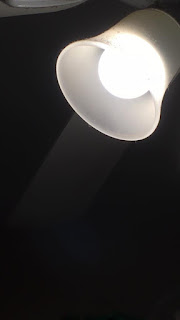It was on a summer evening about 17 years ago, when a congregation that no longer existed had gathered in the American Legion Hall.
Why that congregation no longer met doesn't matter. And the circumstances that brought us there that evening aren't particularly important either. But there were forty of us, fifty of us, sixty of us, maybe more. We had scattered like the knights of Camelot, chasing wild fires in pursuit of the Holy Grail, but unlike King Arthur's knights, of whom but a tithe returned, many if not most of us were there.
It was time for worship.
It's been years, and memory plays tricks. I like to think Janice Gengenbach was leading, while Robert Hamrick accompanied on his trusty keyboard. I'm pretty sure Marcus Eiland was playing his guitar. Mark was there. So, I think, were Brian and his family.
Churches have a wide range of music to draw on, from the Phos Hilarion down to the latest pop gospel release by Casting Sunbeams, but often they have a repertoire of familiar songs they draw on that gives each congregation its own flavor. Community Gospel Church was no exception.
The songs favored by the church worship team were upbeat and often came from Willow Creek, by songwriters like the unfortunately named Brian Doerkson. They included calls to worship like the fittingly titled "Come Now is the Time to Worship" and the interminable "I Can Sing of Your Love Forever," as well as the occasional rollicking dud like "Waves of Mercy."
My oldest daughter was 3, or perhaps 4, at the time. She spent the entire service dancing at the front of the church, lost in worship as only a child can be.
A third of my life so far has passed since that evening. I no longer remember which songs we sang.
Except one.
Written in 1992 by Gary Sadler and Jamie Harvil, "Ancient of Days" is a song that feels like it could have come straight out of the book of Revelation. The first verse began with a steady beat to stomp the feet to. Voices and instruments alike were subdued but determined, as like Four Living Creatures, the congregation pronounced blessing and honor, glory and power upon the Ancient of Days.
And then, just like that, the second verse began, the volume turned up, and the congregation took it to seven.
"Every tongue in heaven and earth shall declare your glory,
Every knee shall bow at your throne in worship,
You will be exalted, O God, and your kingdom
Shall not pass away, O Ancient of Days."
The third verse began a beat later, and the singing hit 11. Hands went up, eyes closed and every throat opened wide.
"Your kingdom shall reign over all the earth!
Sing unto the Ancient of Days.
For who can compare to your matchless worth?
Sing unto the Ancient of Days."
Congregational worship can be a difficult thing to lead. People respond to songs that they know but they hate music that's stale and familiar. They want something traditional with a contemporary sound, with lyrics that are meaningful but not ponderous. Ditch the organ for guitars and drums, please; but remember that this is church, not a set at a nightclub.
That night, that song, none of those concerns was a problem. Whether it was forty throats or twice that, the voices joined together, and incense rose from the altar. The walls and the ceiling of the hall were made of music and every singer there lost themselves in the choir. For one night at least a congregation that had scattered a dozen different directions was restored to life.
And if those assembled there saw a vision of an arm clad in purest samite holding aloft a cup; well then, it was a true vision, one that still has kept hearts warm all the years since.













